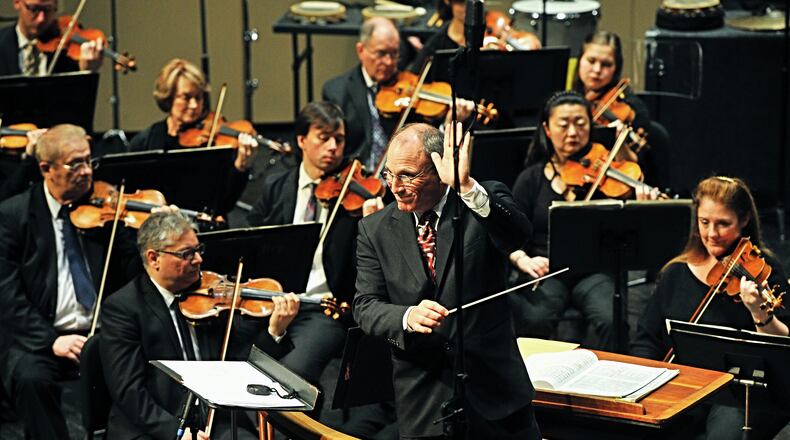>> ‘Hang on, Ohio!’: Dayton Philharmonic releases virtual performance
Q: Before we get into your recommendations, is there anything new you’d like to share?
A: Something new — or new to me — one of the best, most beautiful pieces of orchestral music I've heard in a long time. It is "My Sister's Voice" by Indian-American composer Reena Esmail. It's something I'm definitely planning on the DPO playing during the 2021-2022 season, so all I'll do is tease it now and I can give you more details when we get closer to playing it. For now, I'll stick to recommendations of "old stuff."
Q: What is your first recommendation?
A: John Irving's novel "A Prayer for Owen Meany" — hands-down my favorite book ever — so far, anyway!
Q: How did you discover it?
A: I discovered it when the first section of the book, "The Foul Ball," appeared in The New Yorker magazine fiction section in January 1989. I confess, I'm one of those people who usually skips over the fiction in The New Yorker. But I read this one — possibly because of the baseball-themed title — and I'm so glad I did. I was hooked. In fact, I think that this may have been the very first John Irving I ever read. When the book came out a few months later, I bought it. After that I went back to read earlier Irving books and have pretty much read everything he's written since.
>>Need to buy a unique gift? Shop at the DAI’s Museum Store from home
Q: What is it about the book that resonates with you?
A: Like just about all John Irving stuff, "A Prayer for Owen Meany" is a good story. He creates vivid, interesting characters and you want to keep reading to find out what's going to happen to them next. And there's really no way to predict what that is. Like most of Irving's other books, "Owen Meany" is kind of a shaggy-dog story. It wanders all over the place and there are many seemingly loose ends. But as the book gets to its climax, every single one of those loose ends comes together in a truly moving and powerful finish.
Q: Anything else you’d like to add about this selection?
A: I'm pretty stoic as a reader but this is a book that made me actually laugh out loud — more than once. And it also made me cry, too.
>> 2 new movies opening ‘virtually’ at The Neon this week
Q: What is your second recommendation?
A: The 2014 movie "Love and Mercy," directed by Bill Pohlad. (It stars) Paul Dano and John Cusack as Brian Wilson, younger and older, respectively, and Elizabeth Banks as the woman who helps Brian through his personal struggles.
Q: How did you discover it?
A: The same way I discover many great movies: at The Neon. There are lots of things I miss in our current COVID-19 shutdown, starting with making music with my colleagues in the DPO and playing music for our audiences, but movies at the Neon probably come a close second. I don't see every film that plays there but I see most of them. And I thought the idea of a movie about Brian Wilson and the Beach Boys sounded intriguing and fun.
Q: What is it about this film that resonates with you?
A: Fun? Maybe not fun, as it turns out, but a simply amazing movie. First, for the incredibly sensitive portrayal of Brian and his struggles with mental illness but, especially, for the music. The director and the sound designer somehow managed to make you feel like you were inside Brian Wilson's head as he was creating some of those amazing Beach Boys songs, focusing especially on the era of "Pet Sounds," "Good Vibrations," and "Smile."
Q: Anything else you’d like to add about this selection?
A: There are great scenes inside the studio imagining Brian and the Beach Boys recording with the Wrecking Crew, the LA studio band that was behind so many great 1960s tunes.
Q: What is your third recommendation?
A: Baseball.
Q: How did you get into baseball?
A: I was just about to turn 7 in 1962 when the Mets brought National League baseball back to New York. My father, who had been a big Brooklyn Dodgers fan, took that opportunity to introduce me to the game. He took me to several games at the Polo Grounds that historically loss-filled season but, amazingly — or should I say "amazingly"? — the Mets won every game we saw together!
Q: What is it about the sport that resonates with you?
A: I love just about everything about baseball. I love its leisurely pace — OK boomer! I love how it fills months of the year from mid-February through October, kind of like a soundtrack playing along with the rest of life. I love how you can follow it intensely or casually but pretty much anytime you want it — present times excepted, of course — it's there for you to enjoy … in person, on TV, on the radio, in the newspaper. It's also one of the few things I can have on the TV or radio while I'm studying music. There isn't that much to compete with the music I'm working with in my head. Sure, there's the home team's organist — or, nowadays DJ — playing something in the background from time to time but it's not going constantly.
Q: Anything else you’d like to add about baseball?
A: Like everything else that we all loved about our pre-COVID days, I hope baseball's back soon. I've got a stash of DVDs of archival games I can watch when I'm really jonesing for some hardball, but those will take me only so far.
About the Author





